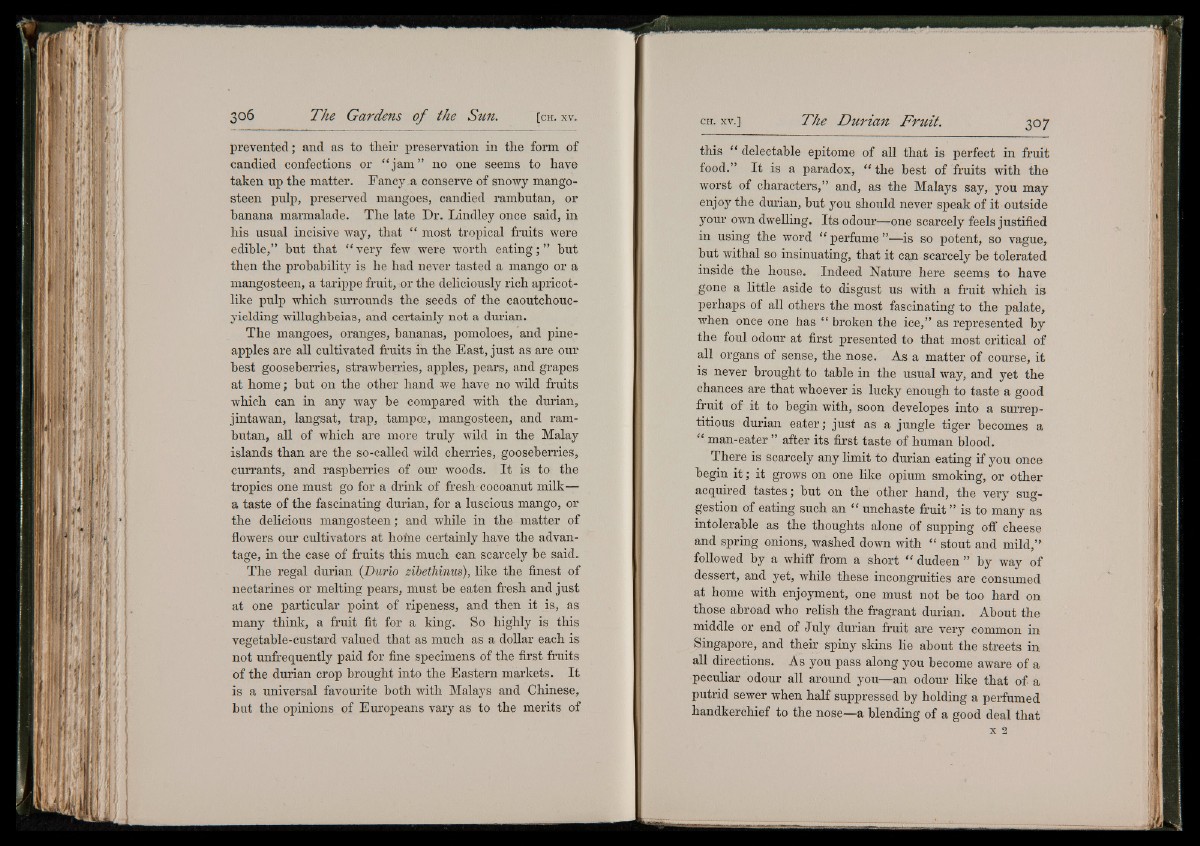
prevented; and as to their preservation in the form of
candied confections or “ jam” no one seems to have
taken up the matter. Fancy .a conserve of snowy mango-
steen pulp, preserved mangoes, candied ramhutan, or
hanana marmalade. The late Dr. Lindley once said, in
his usual incisive way, that “ most tropical fruits were
edible,” hut that “ very few were worth eating; ” but
then the probability is he had never tasted a mango or a
mangosteen, a tarippe fruit, or the deliciously rich apricotlike
pulp which surrounds the seeds of the caoutchouc-
yielding willughbeias, and certainly not a durian.
The mangoes, oranges, bananas, pomoloes, and pineapples
are all cultivated fruits in the East, just as are our
best gooseberries, strawberries, apples, pears, and grapes
at home ; hut on the other hand we have no wild fruits
which can in any way be compared with the durian,
jintawan, langsat, trap, tampoe, mangosteen, and ram-
butan, all of which are more truly wild in the Malay
islands than are the so-called wild cherries, gooseberries,
currants, and raspberries of our woods. It is to the
tropics one must go for a drink of fresh cocoanut milk—
a taste of the fascinating durian, for a luscious mango, or
the delicious mangosteen; and while in the matter of
flowers our cultivators at hoine certainly have the advantage,
in the case of fruits this much can scarcely he said.
The regal durian (Durio zibethinus), like the finest of
nectarines or melting pears, must be eaten fresh and just
at one particular point of ripeness, and then it is, as
many think, a fruit fit for a king. So highly is this
vegetable-custard valued that as much as a dollar each is
not unfrequently paid for fine specimens of the first fruits
of the durian crop brought into the Eastern markets. It
is a universal favourite both with Malays and Chinese,
but the opinions of Europeans vary as to the merits of
this “ delectable epitome of all that is perfect in fruit
food.” It is a paradox, “ the best of fruits with the
worst of characters,” and, as the Malays say, you may
enjoy the durian, hut you should never speak of it outside
your own dwelling. Its odour—one scarcely feels justified
in using the word “ perfume ”—is so potent, so vague,
but withal so insinuating, that it can scarcely be tolerated
inside the house. Indeed Nature here seems to have
gone a little aside to disgust us with a fruit which is
perhaps of all others the most fascinating to the palate,
when once one has “ broken the ice,” as represented by
the foul odour at first presented to that most critical of
all organs of sense, the nose. As a matter of course, it
is never brought to table in the usual way, and yet the
chances are that whoever is lucky enough to taste a good
fruit of it to begin with, soon developes into a surreptitious
durian eater; just as a jungle tiger becomes a
“ man-eater ” after its first taste of human blood.
There is scarcely any limit to durian eating if you once
begin i t ; it grows on one like opium smoking, or other
acquired tastes; hut on the other hand, the very suggestion
of eating such an “ unchaste fruit ” is to many as
intolerable as the thoughts alone of supping off cheese
and spring onions, washed down with “ stout and mild,”
followed by a whiff from a short “ dudeen ” by way of
dessert, and yet, while these incongruities are consumed
at home with enjoyment, one must not be too hard on
those abroad who relish the fragrant durian. About the
middle or end of July durian fruit are very common in
Singapore, and their spiny skins He about the streets in
all directions. As you pass along you become aware of a
pecuhar odour all around you—an odour like that of a
putrid sewer when half suppressed by holding a perfumed
handkerchief to the nose—a blending of a good deal that